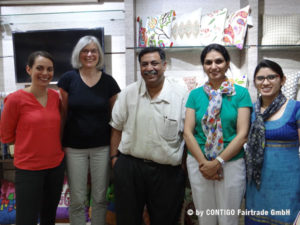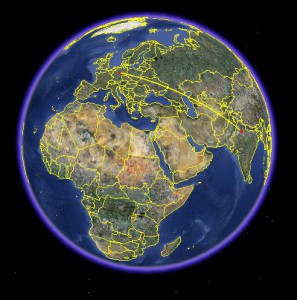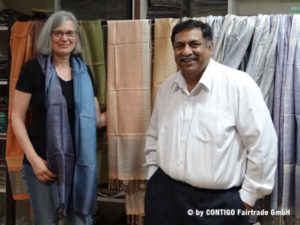Contents
[ hide ]
- 1 Profile of CONTIGO´s partner Eco Tasar
- 1.1 Supply chain
- 1.2 Products
- 1.3 Location
- 1.4 Founded in 2007
- 1.5 History
- 1.6 Cooperation with CONTIGO since 2016
- 1.7 Structure of the organisation
- 1.8 Sales
- 1.9 Goals
- 1.10 Special features
- 2 Fairtrade classification
- 3 Fairtrade aspects
- 3.1 No child labour
- 3.2 No discrimination
- 3.3 Fair wages
- 3.4 Humane working conditions
- 3.5 Transparency
- 4 Monitoring
- 5 Country information
- 6 Video
This trade relationship is currently not active. (status of 2022)
Profile of CONTIGO´s partner Eco Tasar
Company´s device: Weave a hope !
Supply chain
Trading partner: Eco Tasar, medium sized company, private company (Ltd)
Function: Service Provider and coordinator for CONTIGO
Structure: Associated Producers
Tradeway: Direct import CONTIGO
Products
Scarves, sarees and home textiles made of tasar (tussah), muga and eri silk, hand spun and hand woven
Location
Head office: Ghitorni, village in the South West district in the state of Delhi, India – distance to Europe: 6,000km
Founded in 2007
History
- 1984: Founding of the non-governmental organisation PRADAN (= Professional Assistance for Development Action) as a livelihood promotion project with the aim to provide income for people in rural areas in the poorest Indian states (Jharkhand, Bihar, Odisha, Chhattisgarh)
- Project of tasar / sericulture (rearing of silkworms) is errected. Collecting cocoons has always been an additional income for the indigenous people (Adivasi) in the forests of the back-country
- PRADAN wins the Central Silk Board help with technical support, provide expert knowledge and set up economic efficiency
- Over the years till today:
- 1990: Founding of „Masuta“, a cooperation of yarn producers
- Sericulture gets optimised with regards to quality and crops
- Project for developing desease free layings (DLF) is installed
- Focus on afforestation of food plants, own nursery garden, plant care
- Better price realisation for cocoons at the collecting points of the project
- Integration of women into rearing (formerly a taboo) and the processing of the silk
- From 2000 on: professionalising of the yarn production, income generation by silk processing
- 1,000 women have been educated and 2,000 new jobs have been created till 2014. More than 10,000 people are involved in the different processes (sericulture, silk production, weaving, sewing)
- 2007: Eco Tasar emerges from PRADAN as an independent company, main functions: production of textiles, scarves and home textiles of silk, marketing of finished products on the local and international market
Cooperation with CONTIGO since 2016
Structure of the organisation
Corporate structure of Eco Tasar:
- Chairman (Deep Joshi), founding member of PRADAN
- CEO (Khitish Pandya), longtime employee of PRADAN
- Offices in New Delhi and Bhagalpur (state of Bihar)
- Weaving mills in Bhagalpur (state of Bihar) and Fulia (Phulia, state of West Bengal)
- Production of home textiles in Noida (state of Uttar Pradesh)
Khitish Pandaya (CEO) – quote:
„As a social entrepreneur, I strongly believe that providing right economic opportunities to the poor in their own locale and also by helping enhance their capacity to avail such opportunities is a more inclusive and sustainable way of poverty alleviation.“ (see: www.ecotasar.com/)
Number of employees at Eco Tasar:
- 87 permament employees (10 women and 77 men), working in different areas of adminstration and production in New Delhi, Bhagalpur and Noida
Work organisation:
- Purchase of raw materials:
- Cocoons are bought locally: cooperation with appr. 250 women from communities supported by PRADAN, the annual purchase quantity is bought and stored in December
- Additional purchases of natural fibres (cotton, wool) and silk varieties (eri silk, muga silk)
- Regular cooperation with 40 weavers using hand looms (individuals or small workshops in Bihar). Mission statement: „As much handmade as possible.“, the preservation of hand weaving is one goal of Eco Tasar. Fabrics produced by power looms for large orders only
- Designers and freelancers at the headquarters in New Delhi are in charge of product development
Production steps:
- In Jharkhand: sericulture of tasar wild silk (the whole process of silk production, silk rearing, cultivation and care actions)
- In Assam: sericulture of eri silk and ahimsa silk (also known as peace / non-violent silk: the cocoons are only processed after the silkmoth hatched)
- Processing of the cocoons (jabbering, cleaning, spinning) is done by farming families in their remote villages. 1 kg silkyarn can be gathered out of 1,500 cocoons. A silk rearer can produce 15-20 kg silk a year
- In Bhagalpur/Bihar and Fulia (Phulia/West Bengal): Production of fabrics, scarves and sarees. Yarn production and weaving are compatible with housework and farming activities. On a hand loom 2m of fabric per day are woven in average
- Further production steps (scarves):
- Dyeing (natural vegetable or synthetic colours, AZO-free)
- Weaving of the fringes
- In Noida/Uttar Pradesh: manufacturing of home textiles; block print and embroidery is done in smaller workshops (on commission)
Sales
- Home market (20%) – mainly scarves and sarees (137 smaller shops and saree boutiques, multiple shops like Fab India in tourist areas)
- Exports (80%) – mainly home textiles to the U.S.A, Netherlands, France, Italy and Germany
Goals
- To provide income for over 20,000 people by work of Eco Tasar and PRADAN in 2020
- To advance sericulture in order to strengthen this economic branch e.g. for young people, unemployed, dropouts
- To strengthen the brand
Special features
- Focus on the involvement of women in every production step
- Focus on the preservation of this hand weaving art
- Focus on providing income for people in rural areas
Why does CONTIGO work with Eco Tasar:
A convincing concept of poverty elimination which integrates all steps of the value chain from the raw silk to the finished product. High commitment to craftsmanship, best quality, contemporary design.
Fairtrade classification
FTA = Fairtrade Approved
Fairtrade aspects
Eco Tasar complies with the following Fairtrade principles:
No child labour
No discrimination
No discrimination due to gender, disability, religion, ethnicity, sexual orientation, political orientation, or infection with HIV.
Fair wages
- Minimum wage in New Delhi: starting from INR 9,500/ month (INR = Indian Rupee)
- Minimum wage in Uttar Pradesh: starting from INR 8,757/ month
- Minimum wage in Bihar: starting from INR 5,912/ month
- Average wage at Eco Tasar:
- In production, wage for un-skilled workers: INR 6,000-11,000/ month (depending on work and federal state)
- In production, wage for skilled workers: INR 7,500– 19,000/ month (depending on work and federal state)
- Management and administration: over INR 20,000/ month
At the headquarters in New Delhi:
- Employees receive fixed salaries
- Monthly wage is transferred to employees own bank account
- Double wages in case of overtime
- Transport costs are covered
Humane working conditions
Working hours:
At the headquarters in New Delhi:
- 8 hours/day
- 2 breaks à 15 minutes and lunch break à 30 minutes
- 6 days/week
Social benefits:
Employees at the headquarters in New Delhi receive:
- Paid holidays (30 days, non availed leaves will be paid out at the end of the year)
- Payment of contributions to health insurance ESI (=Employee State Insurance): employer pays 4,75%, employee pays 1,75% of monthly wage
- Payment of contributions to pension scheme PF (=Employees´ Provident Fund), employer and employee pay each 12 % of monthly wage
- Continued payment of wage in case of sickness or accidents
- Maternity leave is paid
- Employees who have been with Eco Tasar for over 5 years: after leaving the company Eco Tasar pays a compensation (half monthly salary for every year the employee was with Eco Tasar)
- Education costs for employees children are covered
Educational opportunities:
- Initial training
- Further training opportunities
Occupational safety:
- All safety standards are met
Transparency
- Work contracts are available
- Payroll is available
- Pay slips are available
- SAR (Self Assessment Report) was duly submitted to CONTIGO
Monitoring
- Personal visit in New Delhi (2016, 2017)
- Member of Fair Trade Forum India
- The production site for cutting and sewing is certified by an independent auditor (in regards to social and safety standards)
Country information
See Encyclopaedia Britannica: India




